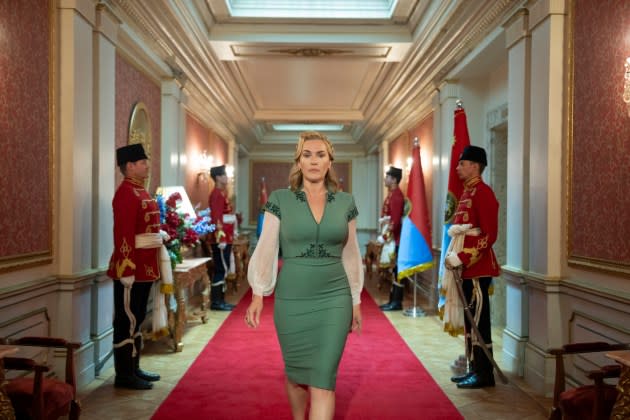‘The Regime’ Drops Kate Winslet’s Ruthless Dictator Into Toothless Political Satire
- Oops!Something went wrong.Please try again later.
- Oops!Something went wrong.Please try again later.
- Oops!Something went wrong.Please try again later.
- Oops!Something went wrong.Please try again later.

In the new HBO limited series The Regime, Kate Winslet plays Elena Vernham, the autocratic ruler of a small nation located somewhere in “Middle Europe.” Most of the action takes place inside Elena’s palace, and we frequently pay visits to a briefing room where Elena berates her cowed advisers. The room, with its huge round table and circular light fixture, very much resembles Ken Adam’s iconic war room set from the Cold War classic Dr. Strangelove. It is probably meant as a nod to the greatest piece of political satire ever filmed. But any project that openly invites a comparison to Stanley Kubrick’s masterpiece is going to come up wanting in some way. And the blurry Regime is unfortunately wanting in several ways.
The six-episode show was created by Will Tracy, an alum of Succession, Last Week Tonight With John Oliver, and The Onion News Network, as well as cowriting the 2022 film The Menu. His résumé is almost entirely satire-focused. With direction by the great Stephen Frears (who splits the episodes here with Jessica Hobbs), and a cast that includes Winslet, Andrea Riseborough, and, in smaller roles, Hugh Grant and Martha Plimpton, there’s no lack of ability here. But Tracy and his collaborators don’t quite seem to know what it is they’re satirizing, nor what tone they’re going for.
More from Rolling Stone
'True Detective: Night Country' Just Gave the Series Its Best Finale Ever
Was Her Family Member the Zodiac Killer? 'The Truth About Jim' Follows One Woman's Quest for Answers
Kate Winslet Shuts Down the Internet's Beloved Kate-Leo Meme
Making a show in 2024 whose fundamental thesis is that autocracies are bad for everyone but the autocrats, and sometimes their friends, doesn’t exactly feel like a fresh or bold statement. Elena’s behavior has some echoes of Putin (she invades a neighboring country that was once part of her own, claiming that everyone involved is in favor of reunification) and Trump (she is erratic, subject to bizarre whims, and largely disconnected from reality). But beyond that, there’s no there there. Near the end of the finale, one character looks back on all the turbulent events that Elena’s behavior caused and haltingly asks, “What was that all about, you think? The whole … all of it?” They can’t articulate what it is that happened, or what it meant, and nor can The Regime itself.
Even more frustrating is the show’s struggle to achieve the balance of absurdity and pathos that made satires like Strangelove strike such a chord back in the Sixties.
The story begins with Corporal Herbert Zubak (Matthias Schoenaerts), a brute from the more old-fashioned rural part of the country(*), being assigned as Elena’s new body man. His primary task is to scan every room she enters for moisture, because her current fixation is on mold. Herbert has been accused of instigating the recent massacre of political protesters, and perpetually commits acts of physical and emotional self-harm whenever he thinks other people aren’t looking. The more time he spends in the company of the mercurial chancellor, the more influence he begins exerting over her, to the point where he seems to be the one running things.
(*) Nearly every prominent character speaks with a U.K. accent, save for Elena’s husband, Nicholas (Guillaume Gallienne), whom she met in France, and Herbert, whom Schoenaerts plays with a slightly cartoonish Iron Curtain dialect. The idea, it seems, is to suggest that the world Elena moves in has nothing to do with the one Herbert is from, but like a lot of The Regime, the juxtaposition never quite works.
With Herbert, and with palace majordomo Agnes (Riseborough), The Regime is attempting to insert some level of drama into all the scenes about how the rest of the country has to dance to Elena’s ridiculous tunes. (Literally, in a few instances, as she insists on singing publicly despite having less than average vocal skills.) But the scenes about Herbert’s pent-up rage, or Agnes’ fear of Elena’s influence over her son Oskar(*), feel wildly out of sync with the ones where Elena becomes obsessed with “potato steam” as a cure-all for her many ailments, or where her various interchangeable toadies drunkenly commiserate about life under her thumb. Winslet is, for the first five episodes, giving a wholly comedic performance, and then the finale jarringly plays almost everything seriously.
(*) In a telling early moment, Elena is pleased to see Oskar making his toys fight one another.

It is, to be fair to Winslet, an excellent comedic performance, and by far the best part of the show. She commits fully to Elena’s various delusions, while always making it clear how fragile she is beneath the glamorous facade she’s erected around herself. In moments of stress, she develops a slight speech impediment, and a side of her mouth begins to droop just a bit, as if Elena recently suffered a mild stroke that she has refused to acknowledge — and that everyone else is too frightened to mention. She’s fun, and there are moments where Elena and Herbert’s psycho-sexual energy becomes so strange that The Regime briefly works despite its other problems. And even if Agnes’ attempt to protect Oskar from Elena’s “co-parenting” feels like part of another project altogether, Riseborough plays the role with so much humanity that, if nothing else, you will wonder if you would have enjoyed that project more than this one.
The production design of the palace — a former luxury hotel Elena seized for her own use when she took power — is impressive, particularly in an episode where Elena gives a tour of the place to a discombobulated U.S. senator (Plimpton). And there are some cutting one-liners here and there — Elena welcomes Herbert to the “soup tureen of worms known as the bureaucracy,” and later complains that a political prisoner’s cell “smells like a hog’s urethra” — but not nearly as many as Tracy and everyone else on Succession gave the Roys.
Even allowing for recency bias, comparisons to Succession feel nearly as unfair as comparisons to Dr. Strangelove. But the late, great HBO Emmy winner did a much better job of making its absurd pieces and its dark ones fit together, in addition to feeling like a more cutting and relevant piece of satire.
At one point, Elena objects to what she feels is the unusual behavior of her staff. “When you’re not normal, it’s like you’re telling me I’m not normal,” she says. “It makes me distrust all of you and make me want you to be dead.” It’s among the more amusing pieces of hypocrisy on display, in part because it leans right into the weirdness of its central character. But almost nothing outside of her is nearly weird enough to make these six hours interesting or funny enough to live up to the assembled talent.
The Regime premieres March 3 on HBO and Max, with episodes releasing weekly. I’ve seen all six episodes.
Best of Rolling Stone

